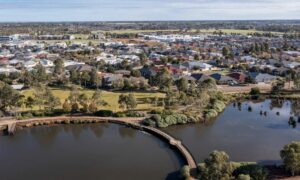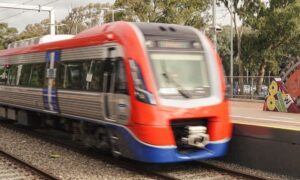By Malcolm King
In the land of the air guitar, the risk adverse promoter is king.
International bands bypass Adelaide because punters leave buying tickets to the last minute, forcing promoters to cancel. But there might be a solution.
So far this year, headline acts such as Lady Gaga, Elvis Costello, Queen, Coldplay, Radiohead and The Eagles, have all given Adelaide the flick, although Bob Dylan played the Entertainment Centre.
Even Robbie Williams, who in 2006 sold out nine stadium concerts and entertained almost half a million Australians — including 80,000 at AAMI Stadium – skipped Adelaide recently.
International acts won’t perform in Adelaide to half filled arenas, when they can perform back-to-back shows in Sydney, Melbourne and Brisbane.
When rock was young, bands toured to generate buzz for their records. That’s where the money was. They tried to keep ticket prices down as a cross-subsidy to market their LP’s (that’s Long Playing records, kids). In the digital age, the situation has flipped. Recorded music is inexpensive to distribute and easy to download – legally and illegally.
While the global market for subscription and streaming services is growing, the US recorded music market is stagnant. Digital music sales in Japan fell by a massive 23 per cent last year, while physical sales slid by 13 per cent. Consumers also tend to buy single tracks, not albums, from sites like Apple’s iTunes.
That’s why international tours must turn a profit for the artists and the promoter. It’s also one reason why ticket prices are so exorbitant. In 1984, U2’s ‘Unforgettable Fire’ tour cost Adelaide folk about $20 a ticket. To get a good seat today, you’ll fork out between $150-$200.
South Australians earn about $136.00 a week less than the average national weekly wage of $1,532.00 (gross) – that’s about $7072 a year – yet ticket prices don’t reflect this discrepancy. As Simply Red sang, “Money is too tight to mention.”
Even the Weatherill Government slung $400,000 to the Rolling Stones, to guarantee the superannuated rockers would play at the Adelaide Oval, as part of a national tour in October.
Mushroom Records CEO Michael Gudinski said the Boomer market was difficult because of the flat local economy and the continual rotation of older acts.
“There are probably too many promoters bringing too many acts out and many were only here a couple of years ago.”
Mr Gudinski said that the Adelaide Entertainment Centre was “short 2000 seats” to make a significant return for both the performers and promoters. He said it was one of the reasons why The Eagles won’t play their final tour here in 2015.
Vic Conrad, owner of Mr V Music in Semaphore and a local music producer, said hedging was a poor strategy.
“It’s good in the short term for the ticket buyer because they save a few dollars but I think it breeds the wrong culture. It’s much healthier to feel the need to get in quickly or risk missing out,” Mr Conrad said.
Here’s the good news. Many die-hards will gladly go in to hock to see their favourite performer. I suggest one of the major reasons why Adelaide has been missing out is hedging.
People hedge because they don’t believe others are going to buy tickets. It’s the same as not buying a ticket. When a band cancels, their doubts are confirmed and the ‘pay off’ is the self-satisfaction of saying ‘I told you so’. It’s habit forming.
If buyers cooperated and bought concert tickets early, the bands would come and play and the reward would be shared equally amongst all concert goers. To stop the hedging, we need to implement an Informed Buyer Strategy.
Let the ticket buying public know how many tickets need to be purchased in a specific time frame for the concert to proceed. Allow the public to see in real time on the web, the numbers of tickets sold daily.
Nominate one percent of tickets as ‘free’ and scatter them at random across the seat allocation, like a lottery. This adds to the motivation of buying a ticket.
In theory, the hardest ticket to buy would be the first one; after that, every ticket purchased brings the event closer to realisation. It forms a ‘community’ of like-minded buyers who exhort others to do the same. It also lends itself to a media event – a ‘concert countdown’.
Adelaide doesn’t have a large population, so it needs to leverage something it has in spades – strong peer relationships. An Informed Buyer Strategy makes use of those relationships to make successful bids for international acts.
Of course, this is not going to work if the bands are poorly promoted or scheduled to play in the middle of winter on a Sunday night. There also has to be local demand. Failing that, it’s a flight to Melbourne and back.




















